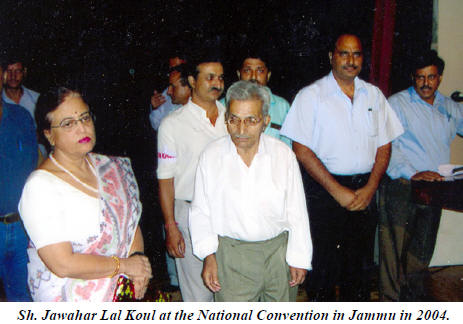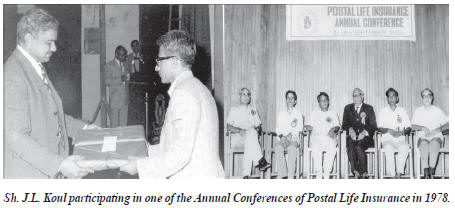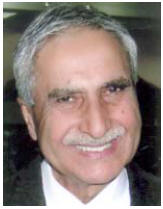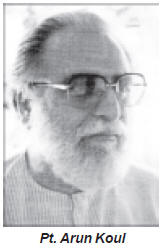By S.M. Pandit
Pt. Jawahar Lal Kaul, Secretary Panun Kashmir, Haryana State and a veteran Trade Unionist passed away at Ambala after a brief illness. At a condolence meeting held in his memory Panun Kashmir paid rich tributes to him and recalled his contribution in community’s struggle.
Born on 23rd July 1933 at Syed Ali Akbar Mohalla Srinagar in a middle class family, at young age of 13 only Mr Kaul was nominated as President of Young Boys National Conference in 1946. Being a National Conference worker, Mr Kaul joined Quit Kashmir Movement.
Sh JL Kaul was subsequently nominated as Vice-President of Mohalla Syed Ali Akbar and Assistant Secretary of Student Federation of J&K. As Chairman of Student Federation of National High School, Karan Nagar, Srinagar, his work was appreciated by Ghulam Mohammad Bakshi, the then Dy Prime Minister of the State. After passing Matric from Solan University (Combined Punjab), Mr Kaul passed Intermediate with Non Medical Subjects from GM College Srinagar.
Unfortunate demise of his father forced Mr Kaul to give up his studies as he had to shoulder the responsibility of his unmarried sister and younger brother. As the responsibility of the family fell on his shoulders, Mr Kaul was in search of livelihood. Being a NC worker, Mr Kaul approached Sheikh Mohammad Abdullah for a job on the basis of poverty and work rendered to the National Conference. He had the taste of the communal politics of NC like many of his community youth when Sheikh Abdullah denied him job with the argument that he could get job anywhere in India. God is supreme and if one door is slammed, he opens the other door of opportunity. Sh SC Jain, Director Postal Life Insurance proved as a Messiah for Mr Kaul as he appointed him in the department after having passed the examination on pay of Rs 127.50 per month.
Mr Kaul was transferred to East Punjab Circle and served in Army Postal Service as Warrant officer for five years. Being committed to his job, Mr Kaul won Gold Medal PLI for selling policies worth 34.97 lakhs in J&K Circle only. Mr Kaul was associated with Employees’ unions in his service career. He was elected as Asstt. Circle Secretary of NFPT (National Federation of Post & Telegraph) Employees Union in 1957 and the General Secretary of P&T Admn. Officers Association. Championing the cause of the workers, Mr Kaul resorted to many ‘Hunger Strikes’. He once went on hunger strike for nine days and subsequently for five days. Mr Kaul had the taste of jail as well. He was arrested in 1959 and remained in Bhatinda jail alongwith some other union members for five days. Mr Kaul retired in 1991. Moved by the plight of displaced people and influenced by the ideology of Panun Kashmir Mr Kaul joined the organisation and served the community with all the commitment at his command till last. Mr Kaul was very much instrumental in ‘Kritgta Yatra’ to Anandpur Sahib in 1995.
Mr Kaul fought for the rights of displaced Kashmiri Hindus living in the Haryana state for their registration and relief. It was the result of his tireless work and voluminous correspondence that 370 photo identity cards have been issued to helpless poor migrants living in Ambala, Rohtak etc. and are being paid a monthly pension of Rs 1000/- by the Social Welfare Ministry, Haryana. Mr Kaul was all praise for the generosity of Haryana Chief Minister and was hopeful that the amount will be enhanced in near future. Mr Kaul was also instrumental in the efforts in getting reservation for the migrants in the Professional and Academic institutions of the state. Presently about 300 seats in different professional colleges of the state are reserved for the migrants.
Panun Kashmir honoured him at the National Convention on 14th September, 2004 at Jammu for his outstanding contribution to the community cause.
JL Kaul-A Karmyogi
By SM Pandit
“I am 73 years old and suffering from Parkinson disease but still I am making my best efforts for the cause of the displaced families and will remain attached to the association till my last breath”. These words themselves give an insight into the character, dedication and comitment of the person. These are the words of Mr Jawahar Lal Kaul, who is a staunch supporter of Panun Kashmir, wedded to its ideology and serving tirelessly for the welfare of the displaced Kashmiri Hindus, particularly in Haryana state.
Braving his old age, weak physique and ill health, Mr Kaul has initiative, commitment and enthusiasm that serve as source of inspiration for any youth who comes into his contact.
Having imbibed the qualities of social service, Mr JL Kaul was moved by the forced exodus of his community brethren in 1989-90 and has been fighting for their cause. He associated himself with Panun Kashmir and is presently serving the organization as state secretary, Haryana. It was tireless work of Mr Kaul that many migrant families in the state got “Photo Identity Cards” and are being provided monthly pension. It was result of his efforts and others’ that Haryana government announced reservation of Kashmiri migrants in its professional colleges. Mr Kauls’ correpsondence with Haryana government, Central government, particularly Union Home Ministry, and other concerned agencies while championing the cause of hapless exiled people serve as a testimony to his concern for the community commitment and patience.
Born on 23rd July 1933 at Syed Ali Akbar Mohalla Srinagar in a middle class family, at young age of 13 only Mr Kaul was nominated as President of Young Boys National Conference in 1946. Being a National Conference worker, Mr Kaul joined Quit Kasmir Movement.
Sh JL Kaul was subsequently nominated as Vice-President of Mohalla Syed Ali Akbar and Assistant Secretary of Student Federation of J&K. As Chairman of Student Federation of National High School, Karan Nagar, Srinagar, his work was appreciated by Ghulam Mohammad Bakshi, the then Dy Prime Mijnister of the State. After passing Matric from Solan University (combined Punjab), Mr Kaul passed Intermediate with Non Medical Subjects from GMN College Srinagar.
Unfortunate demise of his father fored Mr Kaul to give up his studies as he had to shoulder the responsibility of his unmarried sister and younger brother. As the responsibility of the family fell on his shoulders, Mr Kaul was in search of livelihood. Being a NC worker, Mr Kaul approached Sheikh MOhammad Abdullah for a job on the basis of poverty and work rendered to the National Conference.
He had the taste of the communal politicsl of NC like many of his community youth when Sheikh Abdullah denied him job with the argument that he could get job anywhere in India. God is supreme and if one door is slammed, he opens the other door of opportunity. Sh SC Jain Director Postal Life Insurance proved as a Messiah for Mr Kaul as he appointed him in the department after having passed the examination on pay of Rs 127.50 per month.
Mr Kaul was transferred to East Punjab Circle and served in Army Postal Service as Warrant officer for five years. Being committed to his job, Mr Kaul won Gold Medal PLI for selling policies worth 34.97 lakh in J&K circle only. Mr Kaul was associated with employees unions in his service career. He was elected as Asstt. Circle Secretary of NFPT (National Federation of Post & Telegraph) Employees Union in 1957 and the General Secretary of P&T Admn. Officers Association.
Championing the cause of the workers, Mr Kaul resorted to many ‘Hunger Strikes’. He once went on hunger strike for nine days and subsequently for five days. Mr Kaul had the taste of jail as well. He was arrested in 1959 and remained in Bhatinda jail alongwith some other union members for five days. Mr Kaul retired in 1991.
Moved by the plight of displaced people and influenced by the ideology of Panun Kashmir. Mr Kaul joined the organisation and is serving the community with all the commitment at his command. Mr Kaul was very much instrumental in Kritgta Yatra to Anandpur Sahib in 1995. Moved by the response of the Sikhs, including Sh GS Tohra then President SGPC, Mr Kaul feels nostalgic even today.
Mr Kaul fought for the rights of displaced Kashmiri Hindus living in the state for their registration and relief. It was the result of his tireless work and voluminous correspondence that presently 370 photo identity cards have been issued to helpless poor migrants living in Ambala, Rohtak etc. and are being paid a monthly pension of Rs 100/- by the Social Welfare Ministry, Haryana. Mr Kaul is all praise for the generosity of Haryana Chief Minister and is hopeful that the amount will be enhanced in near future. Mr Kaul was also instrumental in the efforts of getting reservation for the migrants in the Professional and Academic institutions of the state and presently about 300 seats in different professional colleges of the state are reserved for the migrants.
Mr Kaul joined Panun Kashmir as coordinator Ambala Distt. He widened the area of influence and is presently state secretary of the organisation.





